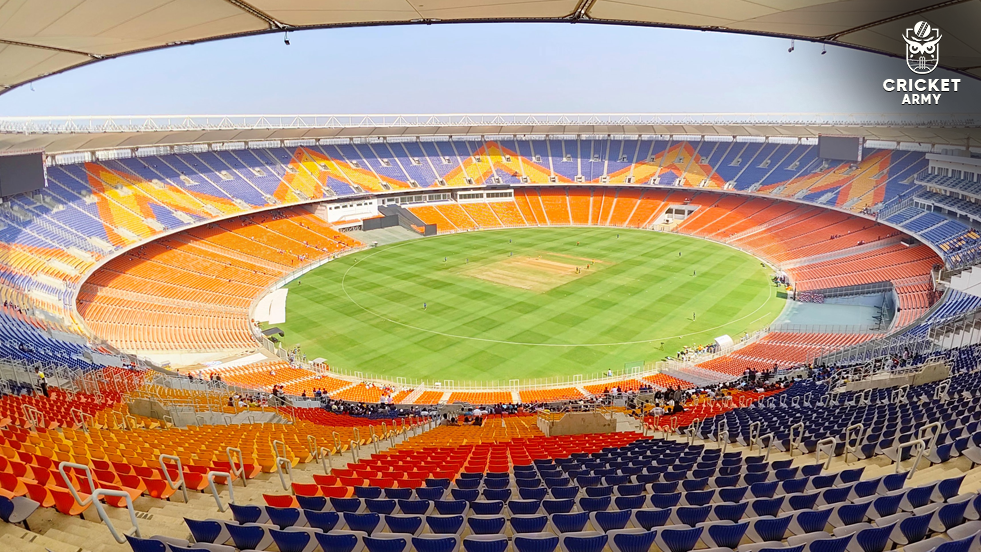The article delves into the global phenomenon of cricket, a sport that commands immense popularity and draws massive crowds in various countries. It emphasizes the unparalleled atmosphere and excitement experienced in packed cricket stadiums. The focus is on legendary grounds constructed over the years with significant capacities to cater to fervent cricket enthusiasts. The article aims to showcase the top 10 largest cricket stadiums worldwide, considering both seating capacity and boundary sizes. Additionally, it promises to provide insights into the historical significance and key facts surrounding these iconic cricketing arenas, where history is regularly made with each match played.
The countdown begins with the Melbourne Cricket Ground (MCG), renowned as one of the biggest and most magnificent cricket stadiums globally.
1. Melbourne Cricket Ground (MCG)
- Capacity: 100,024
- Boundary Size: 85m x 125m
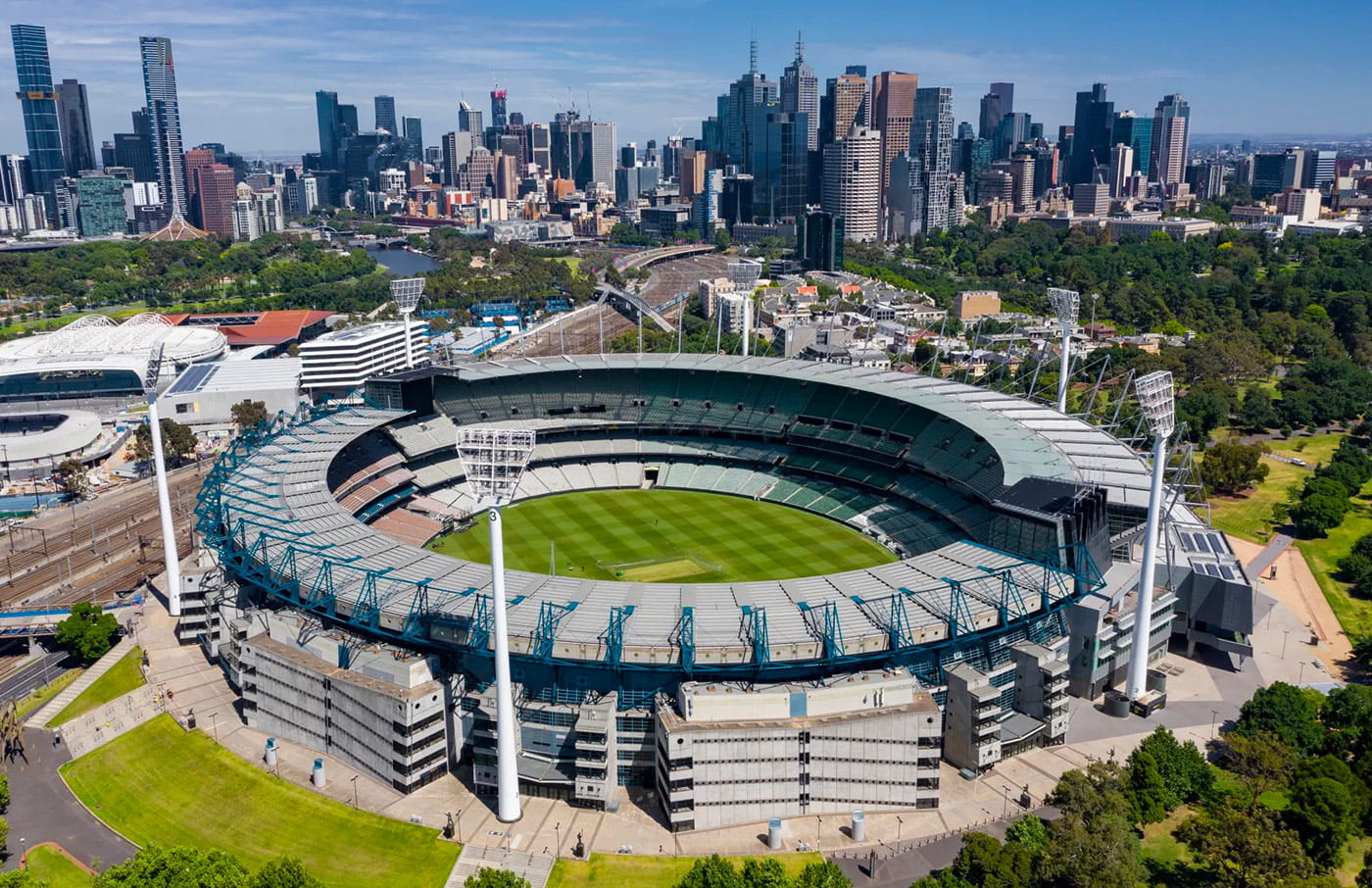
As the largest cricket stadium on the planet, the MCG stands as a colossal venue with a seating capacity of 100,024. Its expansive boundary size, spanning 85m by 125m, contributes to the grandeur and historic significance of this iconic cricketing arena. The MCG, located in Melbourne, Australia, holds a prestigious status in the cricketing world and has witnessed countless historic moments and thrilling matches.
The Melbourne Cricket Ground (MCG) stands as the largest cricket ground globally, located in Australia and built in 1853. Renowned for hosting unforgettable moments in cricketing history, the MCG is not only the home of Australian cricket but also hosts AFL, football, and concerts. Key facts about this iconic stadium include its role in the 1956 Olympics and 2006 Commonwealth Games opening ceremonies. The MCG has witnessed historic cricket matches, such as the 1992 World Cup final and Australia’s memorable Ashes victories. With unusually large boundaries, it poses a challenge for big hits. Boasting state-of-the-art facilities for players and optimal comfort for crowds, the electrifying atmosphere of a packed MCG adds to its allure.
2. Narendra Modi Stadium
- Capacity: 132,000
- Boundary Size: 75m x 85m
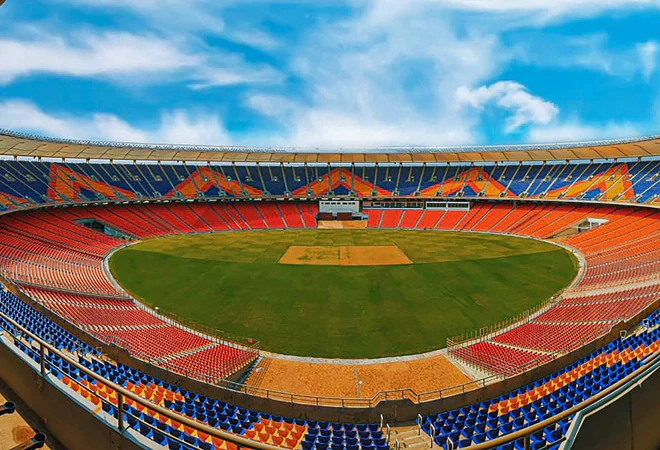
Moving on to the second spot in our countdown, Narendra Modi Stadium emerges with a vast seating capacity of 132,000 and a boundary size of 75m x 85m.
The Narendra Modi Stadium in Ahmedabad, formerly known as Motera Stadium, has recently undergone reconstruction and is now the world’s largest cricket facility, boasting an impressive capacity of 132,000 spectators. With construction costs reaching ₹800 crore, it stands as the most significant cricket stadium ever built. The stadium features a massive in-house clubhouse with 55 rooms, an Olympic-size swimming pool, and 76 corporate boxes. Equipped with state-of-the-art dressing rooms and top-notch player facilities, it hosted the notable ‘Namaste Trump’ event in 2020, drawing over 1 lakh people. Since its inauguration in 2021, the stadium has already been a venue for massively attended IPL matches. The anticipation is high for an electric atmosphere during India games at this iconic venue.
3. Eden Gardens
- Capacity: 66,349
- Boundary Size: 75m x 66m
Next in the countdown is Eden Gardens, with a seating capacity of 66,349 and a boundary size of 75m x 66m.
Eden Gardens in Kolkata, established in 1864, holds the esteemed title of being not only the largest cricket stadium in India but also one of the most iconic globally. Recognized as the spiritual home of Indian cricket, it has garnered a reputation for its boisterous and passionate crowds, creating an atmosphere like no other during matches. Eden Gardens has witnessed historic moments, including the 2001 India-Australia test and the 1987 World Cup final. Notably, Sunil Gavaskar achieved his 10,000th test run, and Kapil Dev claimed his 432nd test wicket on this hallowed ground. The introduction of floodlighting during the 1993 India-England series marked a significant development. Recently undergoing a major renovation, Eden Gardens now boasts enhanced seating and facilities. The electric and deafening roar of a full-capacity crowd at Eden Gardens remains unparalleled in its intensity and fervor.
4. Optus Stadium
- Capacity: 60,000
- Boundary Size: 80m x 94m
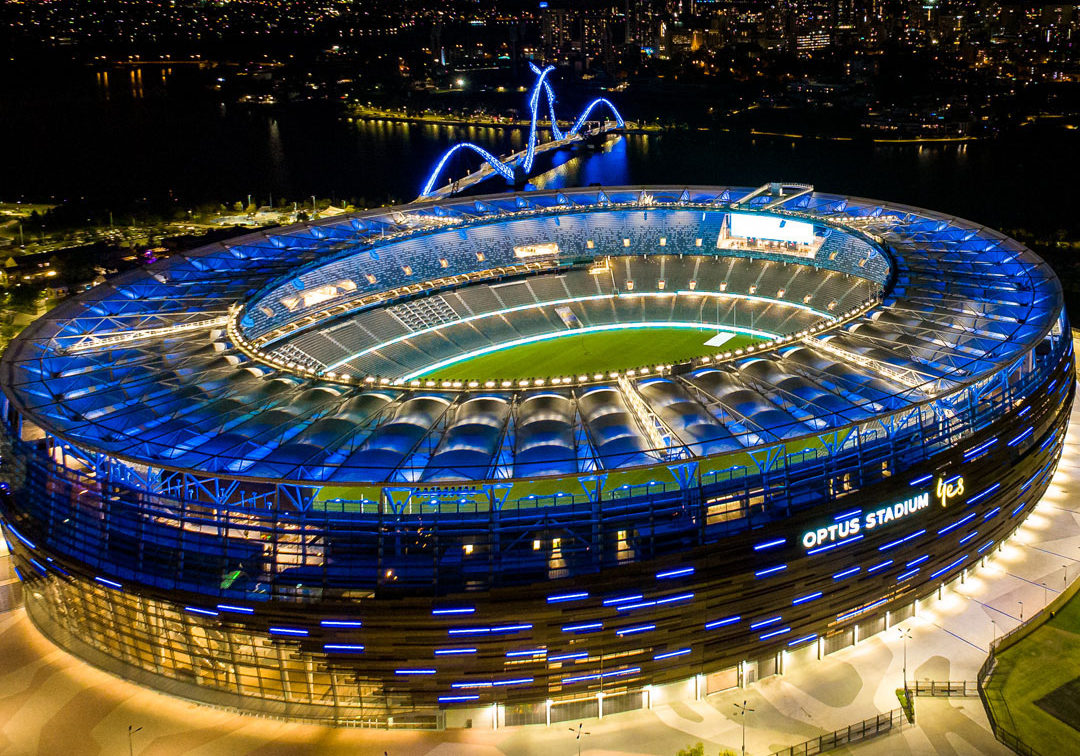
Our countdown features Optus Stadium, a prominent venue with a capacity of 60,000 and a boundary size measuring 80m x 94m. Located in Australia, this stadium has become a notable destination for cricket matches, offering a significant seating capacity and a well-defined playing area.
The Optus Stadium in Perth, Australia, inaugurated in 2018, stands as the largest cricket stadium in the country after the MCG. This cutting-edge venue has swiftly ascended to become Australia’s premier cricket facility. Noteworthy features include its debut hosting a thrilling test match where Australia defeated India in 2018. Distinguishing itself as the first Australian stadium with an LED light system instead of traditional floodlights, Optus Stadium provides excellent crowd movement and concession stands through its expansive open concourses. The venue showcased a women’s T20I triangular series in 2020, involving Australia, England, and India. With a capacity exceeding 60,000 and 150 corporate suites, its outstanding lighting and acoustics contribute to a vibrant atmosphere during night matches.
5. Rajiv Gandhi International Cricket Stadium
- Capacity: 55,000
- Boundary Size: 76m x 74m
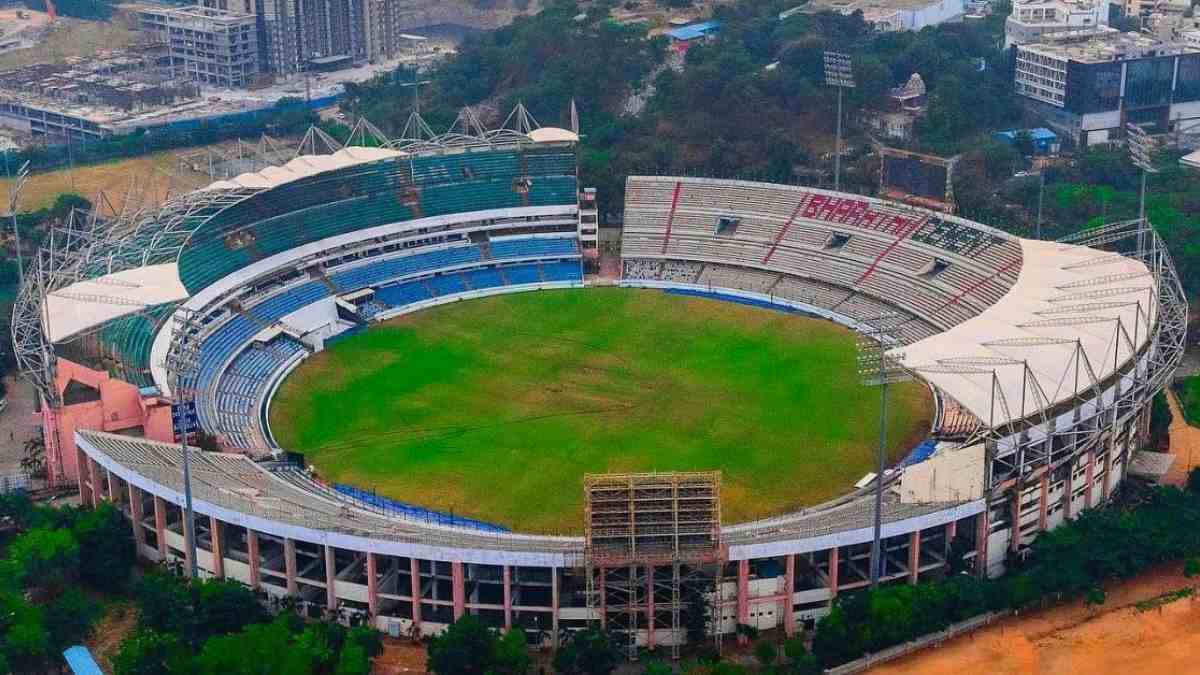
Next on our list is the Rajiv Gandhi International Cricket Stadium, with a seating capacity of 55,000 and a boundary size of 76m x 74m.
The Rajiv Gandhi International Cricket Stadium in Uppal, Hyderabad, stands as the largest cricket stadium in southern India. Since its inaugural international match in 2010, the stadium has been a consistent host to numerous high-profile contests. A notable achievement includes a Guinness World Record for the largest cricketing attendance during an ODI between India and Australia in 2013. The stadium hosted its first thrilling test match in 2017, featuring India against Australia. The ends of the stadium are named after cricket legends Sachin Tendulkar and Kumar Sangakkara, with their quotes displayed on the sidelines. Known for its packed and noisy atmosphere, the stadium poses a formidable challenge for visiting teams. Regularly chosen as a venue for IPL matches, particularly with the Sunrisers Hyderabad franchise, the stadium offers excellent facilities such as in-house gymnasiums, restaurants, and pool tables.
6. Shaheed Veer Narayan Singh International Cricket Stadium
- Capacity: 49,000
- Boundary Size: 77m x 70m
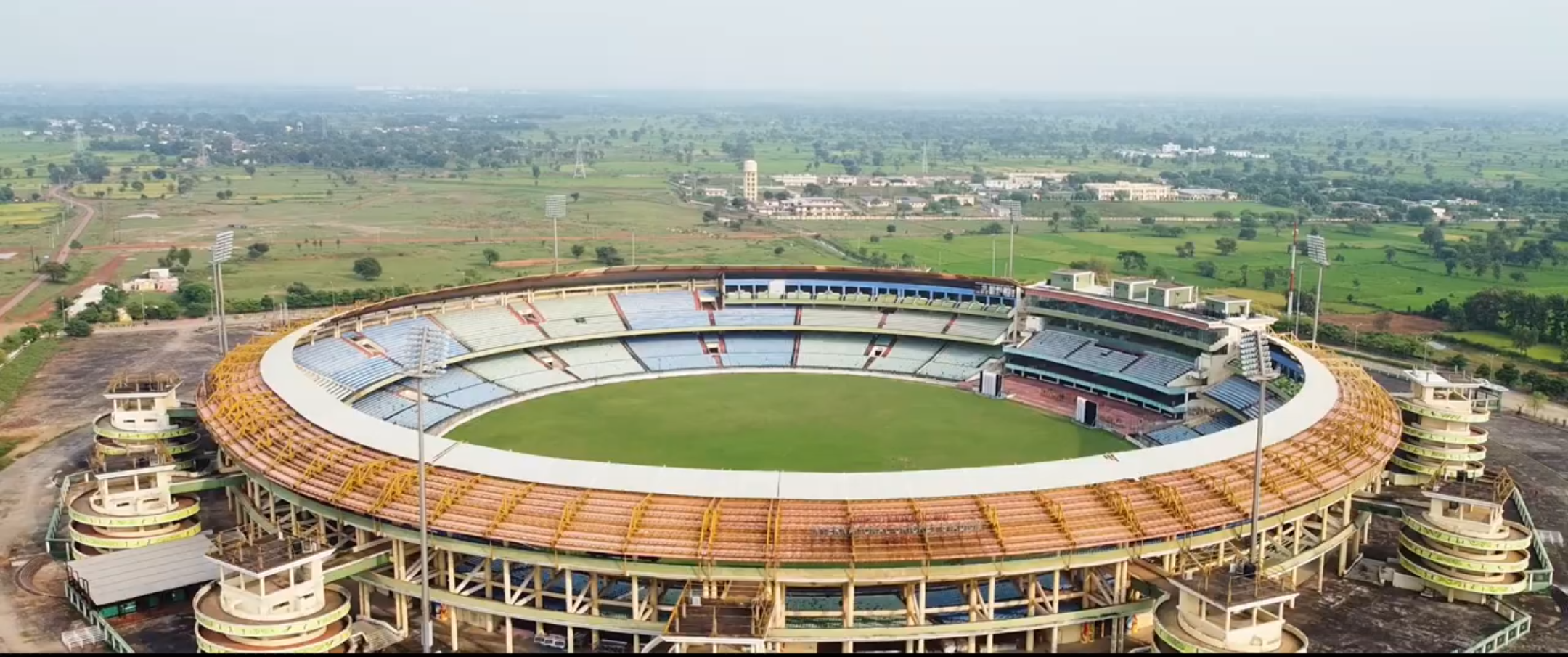
The countdown continues with the Shaheed Veer Narayan Singh International Cricket Stadium, featuring a seating capacity of 49,000 and a boundary size of 77m x 70m.
Inaugurated in 2017, the Shaheed Veer Narayan Singh International Cricket Stadium in Raipur claims the title of the largest cricket stadium in Central India. This contemporary facility has swiftly become a host for various international and IPL fixtures. Recognized for its sporting pitch that offers a balanced contest between bat and ball, the stadium witnessed a significant moment by hosting Afghanistan’s inaugural test match against India in 2018. Named after an iconic figure in the Indian rebellion of 1857, Shaheed Veer Narayan Singh, the stadium is designed with a focus on sustainability, presenting a state-of-the-art green venue. Notably, it has been a platform for women’s international matches, providing an intimate yet energetic experience for crowds with its compact stands.
7. Newlands Cricket Ground
- Capacity: 25,000
- Boundary Size: 82m x 69m
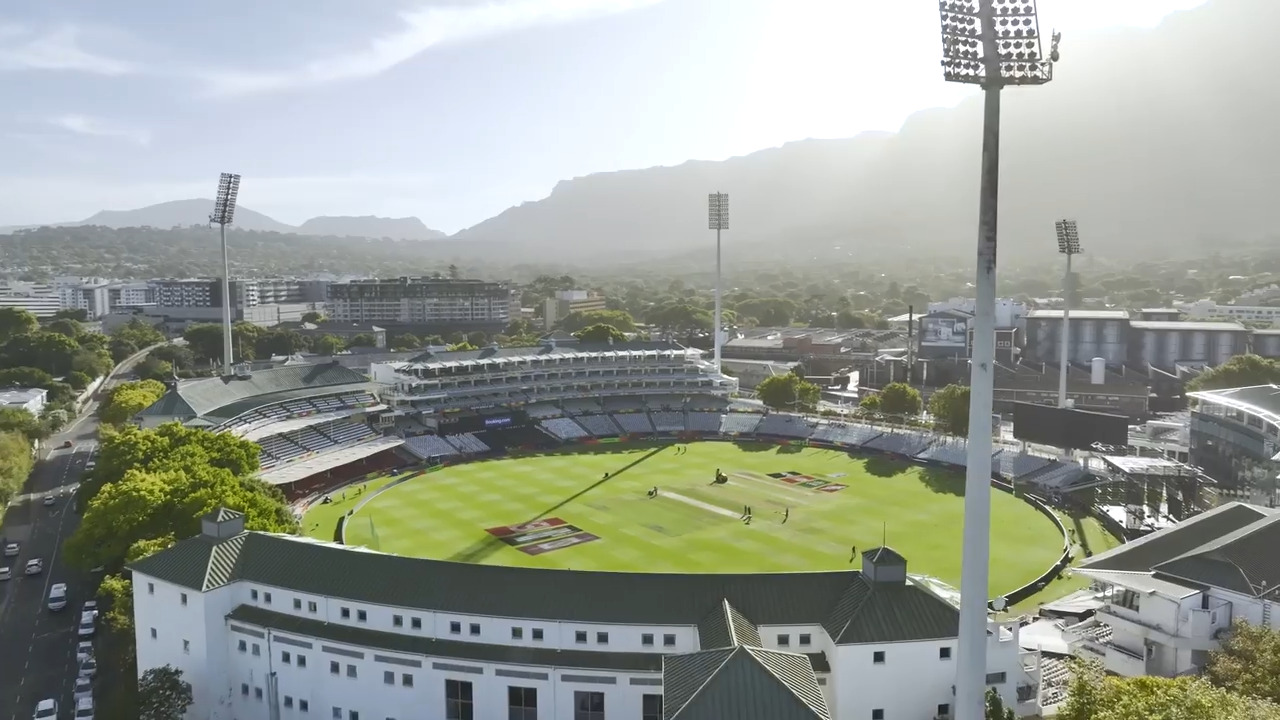
Continuing our countdown, we move to the Newlands Cricket Ground, which accommodates 25,000 spectators and features a boundary size of 82m x 69m.
Nestled in the scenic city of Cape Town, the Newlands Cricket Ground is acclaimed as the most picturesque cricket venue in South Africa. With over 100 test matches played by South Africa, it has become a historic and iconic site for cricket enthusiasts.
Key Facts:
- JP Duminy claimed the first ODI hat-trick by a South African bowler at Newlands in 2011.
- It hosted the inaugural T20 international between South Africa and Australia in 2006.
- Overlooking the majestic Table Mountain, Newlands provides a stunning backdrop for cricket.
- Major upgrades, including floodlights and a new media center, were implemented for the 2003 World Cup.
- In 2006, South Africa achieved their highest successful ODI run chase, scoring 438-9 against Australia.
- While its capacity may be relatively smaller, the Newlands crowd is renowned for generating extremely noisy and passionate support.
8. Gaddafi Stadium
- Capacity: 27,000
- Boundary Size: 74m x 71m
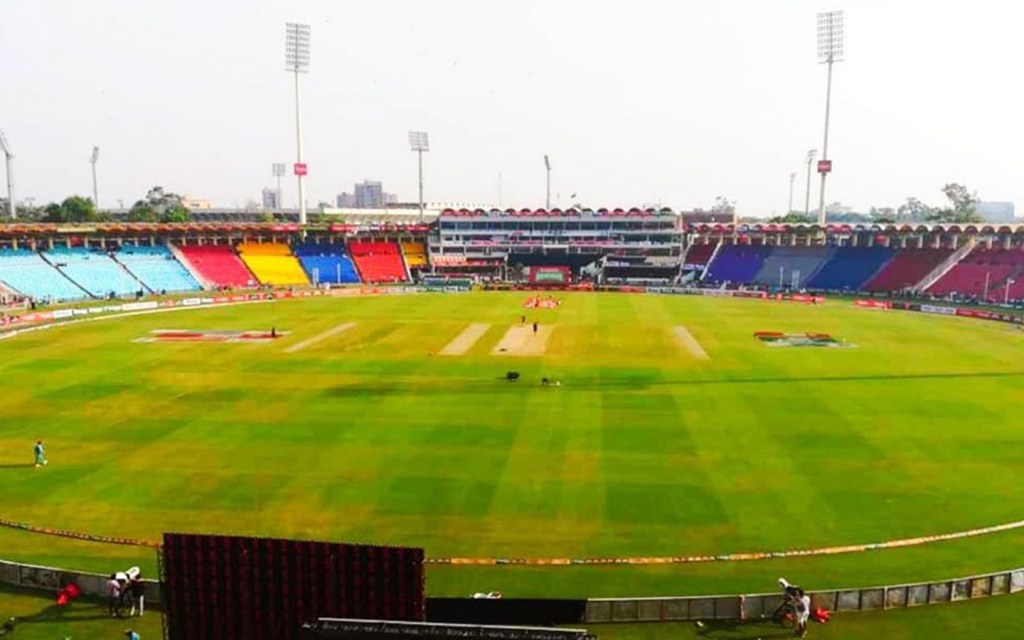
Continuing our list, Gaddafi Stadium takes the eighth spot with a seating capacity of 27,000 and a boundary size of 74m x 71m.
The Gaddafi Stadium in Lahore, Pakistan, originally named Lahore Stadium, holds iconic status in the country and has witnessed several historical cricket matches.
Key Details:
- In 1955, Pakistan achieved its first test victory at the Gaddafi Stadium against New Zealand.
- Sri Lanka secured its first-ever test win at this venue by defeating Pakistan in 1985.
- Imran Khan’s remarkable bowling figures of 8/60 against India were recorded here in 1982.
- In 2007, the stadium underwent significant redesign and facility upgrades to meet international standards.
- The Gaddafi Stadium hosted the 1996 World Cup final, a memorable match where Sri Lanka triumphed over Australia.
- Known for its electrifying and boisterous atmosphere when filled to capacity, the stadium continues to be a vital cricketing venue.
9. Sheikh Zayed Stadium
- Capacity: 27,000
- Boundary Size: 85m x 78m
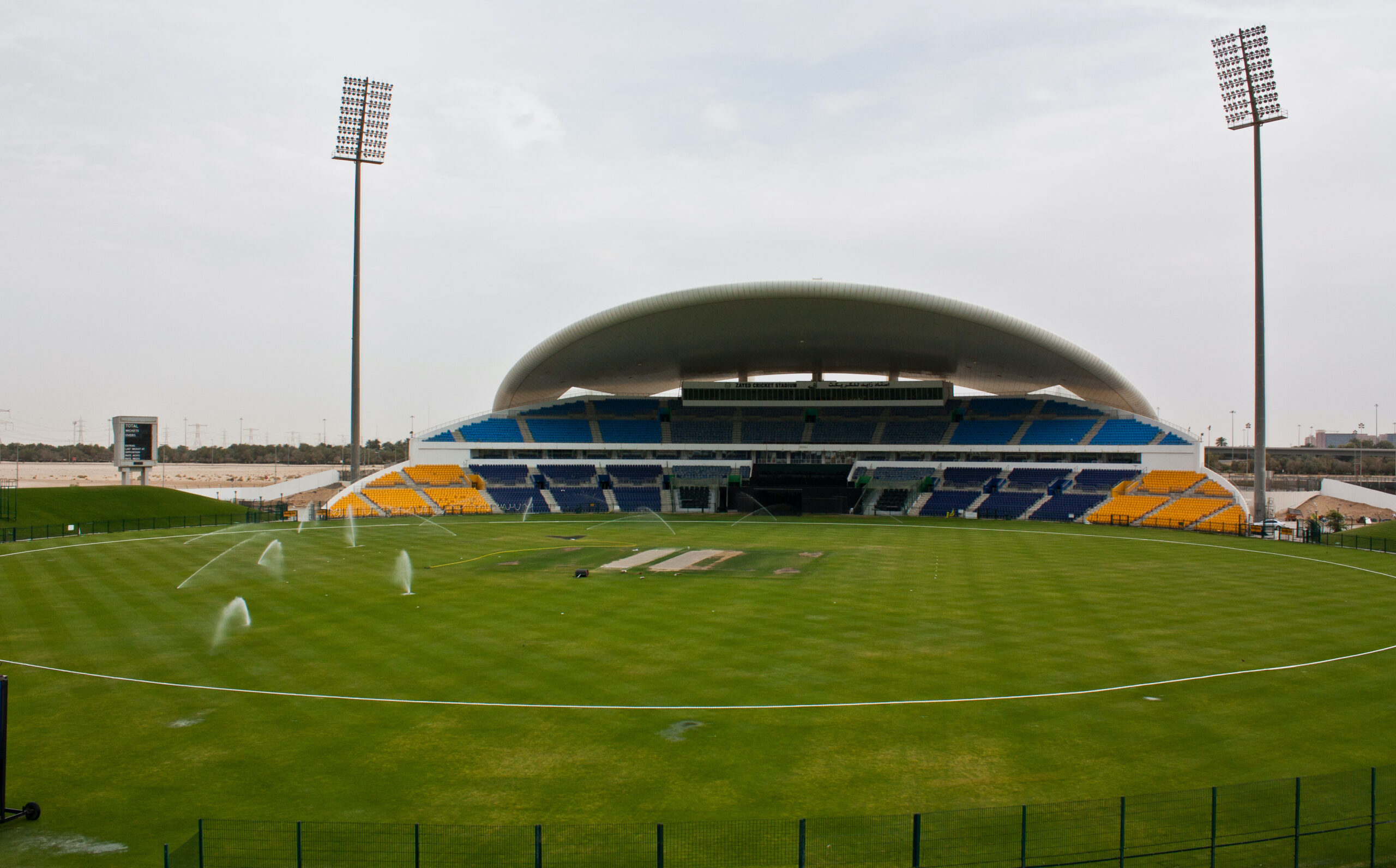 Entering the ninth spot in our list, Sheikh Zayed Stadium offers a seating capacity of 27,000 and a boundary size of 85m x 78m.
Entering the ninth spot in our list, Sheikh Zayed Stadium offers a seating capacity of 27,000 and a boundary size of 85m x 78m.
Opened in 2004, the Sheikh Zayed Stadium in Abu Dhabi has established itself as a world-class cricket venue in the UAE, known for its excellent facilities and serving as a neutral host venue of choice.
Key Features:
- In 2009, it hosted the first-ever day-night test match between Pakistan and Australia.
- The stadium has been a preferred host for international teams during their tours to the UAE due to security concerns in their home countries.
- With 36 corporate suites, 4 dressing rooms, and multiple practice pitches of equal standard, it provides top-notch amenities.
- Witnessed thrilling contests such as the tied ODI between India and Afghanistan in 2018.
- Equipped with floodlights, the stadium allows matches to continue at night with optimum visibility.
- The stands are designed to bring crowds right next to the action, creating a vibrant and engaging atmosphere.
10. Sydney Cricket Ground (SCG)
- Capacity: 48,000
- Boundary Size: 89m x 82m
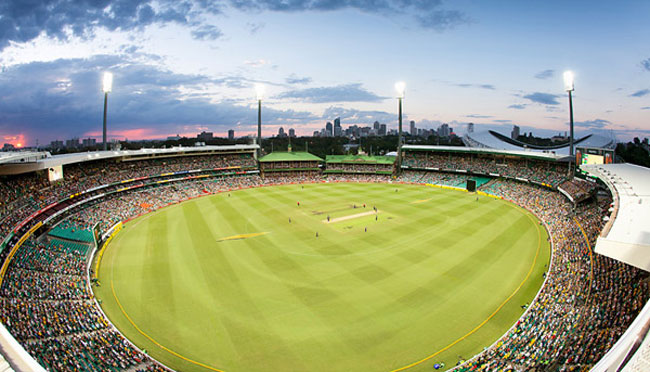
Concluding our list, the Sydney Cricket Ground (SCG) claims the tenth spot with a seating capacity of 48,000 and a boundary size of 89m x 82m.
The Sydney Cricket Ground (SCG), located in the heart of Sydney’s CBD, stands as one of Australia’s most storied and historic cricket venues, hosting significant moments since its opening in 1854.
Key Facts:
- The SCG hosted the first-ever test match between Australia and England in 1882, making it one of the oldest active cricket grounds globally.
- It has been the venue for four World Cup finals, holding the record for the most finals hosted by any ground worldwide.
- The SCG is remembered for the controversial underarm bowling incident between Australia and New Zealand in 1981.
- In 2006, Shane Warne created history by claiming his 700th test wicket at the SCG.
- The famous Bradman Stand and Museum celebrate the legendary achievements of Sir Don Bradman.
- SCG members traditionally enjoy the privilege of bringing their own umbrellas, food, and drinks, a testament to the rich heritage and unique traditions of the venue.


